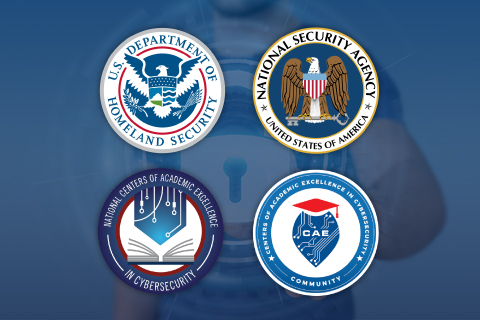Cybersecurity

Quick Facts
- Program: Information Technology
- Pathway: STEM
- Campus: All Campuses
Our Cybersecurity program is nationally recognized by the National Security Agency (NSA) as a Center of Academic Excellence in Cyber Defense.
Cybersecurity professionals plan and implement security measures to safeguard critical information and computer networks.
Explore on This Page
Cyber Hub
Cyber Hub: Our Center for Cybersecurity
Our Cyber Hub focuses on:
- Supporting our students’ academic activities to promote cybersecurity excellence
- Maintaining and improving our academic programs of study
- Collaborating with our community to raise cybersecurity awareness
- Demonstrating best practices in cybersecurity defense
- Providing current, useful cybersecurity resources for our students and community
Job Titles & Career Info
Our Program
Why Choose Cybersecurity?
- Study in a Center of Academic Excellence in Cyber Defense: Our
Cybersecurity program is nationally recognized by the National Security Agency (NSA) as a Center of Academic Excellence in Cyber Defense - Have access to resources in the Centers of Academic Excellence (CAE) in Cybersecurity Community
- Enter a growing field: Demand for information security analysts is growing as data breaches are becoming more frequent
- Have a choice in where you work because organizations in almost every sector need information security professionals
- Be a technology detective & analyze data protection through different lenses, for example, as hackers, consumers, employees, law enforcement, or lawyers
Prepare for What You Will Do at Work
- Implement security best practices
- Detect intrusions to computer system.
- Be proactive in addressing hacking attempts with defensive countermeasures
- Manage security crises
- Understand cyber law & ethics issues
Marketable Skills You Will Learn
- Critical thinking
- Reasoning
- Communication
- Personal & social responsibility
- Teamwork
- Computer literacy
Before You Enroll, Think About:
- Being a lifelong learner will help you advance in your career because you will always
need to:
- Stay current with the latest methods attackers use to compromise computer systems
- Research new security technologies to determine which are the most effective protection for your organization
- Information security professionals have to be on call outside of normal business hours in case of emergencies.
- Many employers prefer to hire candidates with information security certifications.
- 3 skills or work style traits that will help you succeed in this field:
- Analytical thinking
- Flexibility
- Integrity
Need a boost to get ready for college?
Talk to your advisor about Developmental Studies if your TSI scores say you need some help in math or reading and writing.
Degrees & Certificates
Degree
Certificates
Level 1
Level 2
Continuing Education Program
Program Data
Our Associate of Applied Science in Information Technology Cybersecurity degree program requires 60 semester credit hours for completion. The program consists of 2 certificates:
- Level 1 Certificate in Cybersecurity Specialist
- Level 2 Certificate in Ethical Hacking
Graduates will be able to apply current industry-accepted practices as well as new and emerging practices when solving real-world coding, cybersecurity, and ethical hacking problems in the industry.
Program Student Learning Outcomes (PSLOs)
The PSLOs for the Associate of Applied Science in Information Technology Cybersecurity degree are as follows:
- Explain information systems security and its effect on people and businesses
- Describe malicious attacks, threats, and vulnerabilities, and how they impact an IT infrastructure
- Describe the major categories of scanning (port, configuration, protocol, IP address, internal vs. internal) and analysis tools and describe the specific tools used within each category
- Explain how businesses apply cryptography in maintaining information security
- Describe networking principles and security mechanisms (i.e., tools—FW, UTM, HIDs/NIDS), including secure network designs
- Describe the major components and techniques of incident response, disaster recovery, backups/restores, and business continuity planning
- Demonstrate an understanding of the typical stages in the hacking/ethical hacking process to include motivations and intentions (white, gray, black)
- Demonstrate the major activities, tools, and techniques used in each stage (cyber kill chain)
- Demonstrate an understanding how vulnerability testing results can dictate what actions are required to harden operating systems and ensure they are less vulnerable to attack
How Much Time & Money to Finish?
2024–2025 Academic Year
| Degree or Certificate | Program Title | Semester Credit Hours | Total Tuition & Fees |
|---|---|---|---|
| AAS | Information Technology-Cybersecurity | 60 | $4,440 |
| CRT1 | Cybersecurity Specialist | 27 | $1,998 |
| CRT2 | Ethical Hacking | 47 | $3,478 |
Notes:
- Tuition is based on in-state, in-county rates.
- Totals do not include textbooks and other materials.
Continuing Education Programs
Time commitments and fees vary depending on the course.
Earn More Choices & More Money
Transfer to a college or university to continue your studies. Earning a bachelor’s degree opens the door to promotion opportunities.
Next steps
- Talk to your advisor about planning for transfer
- Explore transfer schools
Start on Your Pathway!
- Apply to TCC
- Find out about financial aid
- Talk to an academic advisor
- Visit career services
- Request a transcript evaluation if you are transferring to TCC
Contact
Northeast Campus
Jeffrey Koch, Ph.D.
Professor & Cybersecurity Program Coordinator
Call 817-515-6660
Email jeffrey.koch@tccd.edu
South Campus
Michael A. Jackson
Assistant Professor & Department Chair
Call 817-515-4578
Email michael.jackson@tccd.edu
Trinity River Campus
Katsuhiko "Kirk" Oda, Ph.D., GISP
Associate Professor & Department Chair
Call 817-515-1936
Email katsuhiko.oda@tccd.edu
TCC Connect Campus
Shahla Durany
Instructor & Coordinator of Computer Science / Information Technology
Point of Contact, Center of Academic Excellence in Cyber Defense (CAE-CD)
Call 817-515-4833
Email shahla.durany@tccd.edu
Updated October 31, 2024
